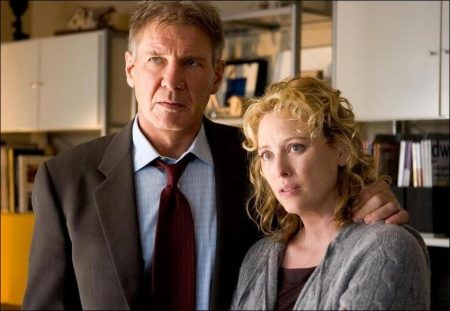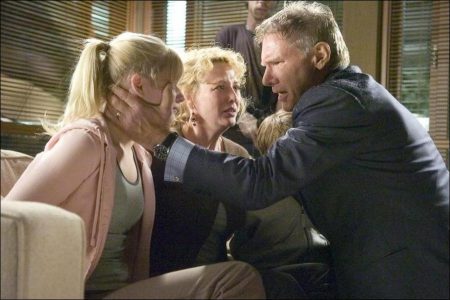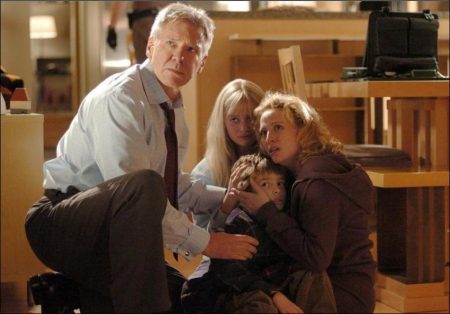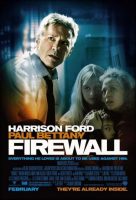Tagline: Everything he loves is about to be used against him.
After a security chief for a global bank is forced to topple his own security safeguards and steal $37 million from the bank to save his kidnapped family, he has to stop the kidnappers, who’ve created a complex trail that will make him look guilty of embezzlement.
Harrison Ford plays the head of security at a major global bank whose wife and children are held for ransom in order to convince him to rob his own bank for millions of dollars.
Computer security specialist Jack Stanfield (Harrison Ford) works for the Seattle-based Landrock Pacific Bank. A trusted top-ranking executive, he has built his career and reputation on designing the most effective anti-theft computer systems in the industry, protecting the bank’s financial holdings from the constant threat of increasingly sophisticated internet hackers with his complex network of tracers, access codes and firewalls.
Jack’s position affords a comfortable life for him, his architect wife Beth (Virginia Madsen) and their two young children – a standard of living that includes a beautiful home in a residential community just outside the city. But there’s a vulnerability in Jack’s system that he has not accounted for: himself. It’s a vulnerability that one very ruthless and resourceful thief is poised to exploit.
Bill Cox (Paul Bettany) has been studying Jack and his family for many months; monitoring their online activity, listening to their calls and learning their daily routines with an arsenal of digital and video recorders and parabolic microphones that tap into the most personal of information. He knows the names of their children’s friends, their medical histories, and the I.D. code for the security station that guards their neighborhood.
Having spent the better part of a year methodically infiltrating every aspect of Jack’s identity, Cox is now ready to make good on his investment. Leading a tight team of mercenary accomplices, he seizes control of the Stanfield house, making Beth and the kids terrified hostages in their own home and Jack his unwilling pawn in a scheme to steal $100 million from the Landrock Pacific Bank.
With every possible escape route shrewdly anticipated and blocked by Cox, every potential ally out of reach and the lives of his wife and children at stake, Jack is forced to find a breach in his own formidable security system to siphon funds into his captor’s offshore account – incriminating himself in the process and eradicating any electronic evidence that Cox ever existed.
Under constant surveillance, he has only hours to accomplish the risky transactions while desperately hunting for a loophole in the thief’s own impenetrable wall of subterfuge and false identities to save his family and beat Cox at his own game.
About the Production
When banking security specialist Jack Stanfield (Harrison Ford) heads home after a day’s work at the Pacific Landrock Bank, he generally breathes a sigh of relief. It’s not that he isn’t fully committed to the job, it’s just that he’s glad to be away from the ever-present cameras and identity checks, the constant maintenance and upgrading of elaborate electronic firewall defense measures that have become standard business practice in this age of online communication and commerce – and online crime. As he parks his car and unlocks the door to his upscale suburban home, Jack would never suspect that here, too, his every move is being observed.
He exchanges greetings with his wife Beth (Virginia Madsen) and they discuss the details of their day while their children argue over the television remote control, unaware that their every word is being recorded via state-of-the-art sensors tuned to every room in the house. When Jack uses the phone, his conversations are overheard. When he opens his E-mail, pays bills, logs onto the Internet, every keystroke is captured. It seems that someone is exceptionally interested in Jack’s habits and schedules, his relationships and concerns….his potential weaknesses.
“The idea that someone evil could attach himself to you and worm his way into your life like that both fascinated me and creeped me out,” says Firewall screenwriter Joe Forte, who poses some disturbing questions about our expectations of privacy and security. “This is a movie about vulnerability,” he adds, noting that most people never encounter this kind of extreme intrusion, so don’t even consider it a possibility. But the reality is, as uncommon as such a scenario might be, “it could potentially happen to anyone.”
“People’s belief that their computers are secure is far from the truth,” says Harrison Ford. “It only depends upon someone having a clear ambition, plus the expertise and energy to break into your system, as well as a compelling reason to do it.” Add to that the number of ways in which surveillance can infringe upon the intimate details of everyday life with equipment readily available on the Internet, and the illusion of privacy wears thin. “I think most people are safe only because they simply don’t have things the bad guys want.”
In this case, it’s not the Stanfields the bad guys are after. It’s the bank. The bulk of a bank’s assets today are more likely to exist not in concrete-reinforced vaults but in cyberspace, attests computer security expert Lawrence T. Levine, a founder of SecurePipe, who provides information security services to businesses worldwide and was a technical consultant on the film. “The industry has experienced a huge transition,” he says.
“The amount of cash in a bank is often insignificant compared to what’s in the computers, generally no more than one percent. So if 99 percent is in the computers, and you’re talking about banks with holdings measured in billions of dollars, then those computers are a very meaningful target for hackers.”
“We’re moving beyond the age of old-fashioned bank robberies. It’s an electronic world and vast sums of money are controlled by codes and keyboards,” says Firewall producer Armyan Bernstein, producer of the Golden Globe-nominated The Hurricane (which he also co-wrote), Thirteen Days and the Harrison Ford blockbuster Air Force One.
Citing pre-production research the Firewall team conducted into the banking industry, Bernstein notes that security today is a 24-hour effort, with teams of experts dedicated to “circumvent thieves on the Internet trying to break into the system. It’s happening right now, as we speak. Someone is trying to crack the firewall of a bank and walk away with your money.”
Combine that reality with the shock of a home invasion and you have the nightmare possibility that provided the inspiration for Firewall, in which the fictional Jack Stanfield finds himself facing such an insidious and overpowering adversary – a man who takes control of his entire life. Knowing any system that can be built can be breached, he then forces Jack to override his own security protocol to steal $100 million from the bank where he works.
“Here’s a man who has spent his entire life building a career and a reputation, a loving family, a safe home, happiness, essentially the American dream, and it’s all taken away from him in one fell swoop,” says Firewall producer Basil Iwanyk, whose production credits include Terminator 3 and The Laws of Attraction and who worked with Ford on K-19: The Widowmaker. He believes this is the emotional core of the story. “It’s not just devastating, it’s devastation at a primal level and something that, I think, really hits home for most people.”
The mastermind behind this cunning crime, the man who calls himself Bill Cox, is played by Paul Bettany, whose performance as Dr. Maturin in Master and Commander: The Far Side of the World earned a 2003 BAFTA nomination. Bettany sees the deadly but dispassionate Cox as “essentially a businessman. He does whatever is necessary to get the job done,” while conceding, “he’s also a thief and a psychopath, but I don’t think he sees himself as a cruel man. It’s not personal. He has simply decided to make a lot of money very quickly and using Jack is the most logical and expedient way to achieve that end.
Having meticulously laid the groundwork for nearly a year, Cox’s attack is twofold: most dramatically, in the form of a home invasion kidnapping; and electronically, with fraudulent gambling debts racked up in Jack’s name designed to ruin his reputation and portray him as the real bank robber long after Cox slips quietly away. “He’s contrived to take advantage of the fact that the bank where Jack has worked for 20 years is merging with a larger bank and there’s a good likelihood that Jack will be eventually forced out, which creates a perfect motive for his being a thief,” Ford explains. No one else would have the means, opportunity and a motive this strong. Even if Jack tells the truth about what really happened, who would believe him?
“The technology that could prove Cox was there, the cameras and computer records, can all be manipulated,” screenwriter Forte points out. “If you erase the images he ceases to exist.” Jack’s first clue that something is wrong is a visit from a creditor over bogus gambling debts – a maneuver which later proves to be Cox’s lethal calling card. At the time, he dismisses it as an error or some small-scale identity theft, likely a misappropriated credit card number – annoying but salvageable. In his business, it’s nothing new.
It isn’t until Cox turns up with a cell phone photo of his captive and terrified family that Jack realizes what he’s up against. Even then, he can only guess at how far Cox’s control extends. From that moment, the two men are engaged in an ever-intensifying battle of wits with the highest possible stakes – for Cox, the biggest and most audacious heist of his life, and for Jack, the well-being of the three people who mean everything in the world to him.
“Predominantly, this is a thriller rather than an action movie. It’s about tension,” offers Firewall director Richard Loncraine, citing the edgy and combustible interplay between the protagonists. “It’s a duel between these two men.”
An Emmy Award winner for his work on HBO’s highly acclaimed World War II miniseries Band of Brothers, Loncraine earned additional Emmy and DGA nominations for directing the HBO dramas The Gathering Storm and My House in Umbria. As a writer, he shared a 1995 BAFTA nomination for his screenplay of the feature Richard III, which he also directed. “There are some very explosive moments and some dramatic fights and action sequences but the focus is the story, about a man who rises to an intimidating challenge where the game plan changes minute by minute, and who fights back with everything he has.
“Jack Stanfield is definitely not a tough-guy character,” says Ford. “There’s a lot of emotion involved and a lot of anxiety because even when he’s trying to cooperate the job doesn’t go smoothly.”
The Academy Award-nominated actor acknowledges a preference for “stories in which my character is in an extreme situation. I look for genuine characters in a compelling story. I don’t think of them as heroic figures, but as people who find themselves in particular circumstances and try to prevail.” As Landrock Pacific Bank is in the process of being acquired by the multinational Accuwest, vital equipment has been moved off-site, “making Cox’s original scheme no longer possible. It then becomes necessary for Jack to cobble together an alternate way to get into his own well-engineered computer security system, which is a lot more dangerous.”
Simultaneously, Jack’s movements come under increasing scrutiny by Accuwest executive and potential rival Gary Mitchell (Robert Patrick), with whom he has already locked horns over security procedures. Anxious that all goes smoothly, Landrock CEO Arlin Forrester (Alan Arkin) presses Jack to cooperate with the new management and make himself available for questions. Meanwhile Cox, seeking to cut Jack off from anyone who might offer him help, forces him to fire his trusted assistant Janet (Mary Rajskub) and sends his old friend and colleague Harry (Robert Forster) out of town.
As Jack struggles to carry out Cox’s instructions without getting caught, he searches for a way to manipulate the system in his favor – anything that might give him an edge over his captor and something to bargain with for the release of his family. But if Cox recognizes a trap it could only make matters worse.
Perfect Plan. Perfect execution… Wrong man.
“The combination of Harrison and Paul is what really makes this exciting,” says Loncraine. “So much of it is pure chemistry; you cannot buy it and you cannot manufacture it.”
The director, who refers to his charismatic leading man as “one tough bugger,” recognizes how Ford’s instincts and his understanding of what transpires behind the camera adds depth to his performances. “He’s particularly good at taking a scene in which he has no dialogue, in which he’s, say, just peering through a crack in the door at something going on in another room, and reacting to that. He’s able to give shape to a scene in which, on the page, is not that fully structured. It’s remarkable. He sees moments in the piece, peaks and troughs in each scene, and knows very skillfully how far to wind the tension.”
Starting from a position of relative comfort and control, Jack’s main concern as the story opens is some corporate turbulence and a nagging personality conflict with a competitive colleague. On top of that, he thinks someone has hijacked his credit card, which will require some sorting out. Then Cox strikes. Within minutes, Jack is plunged into a nightmare of such dire extremes it effectively obliterates these and every other concern he might have had before.
Before long, he will be forced into unfamiliar violence as he tries to save the lives of the people he loves, pushing past whatever standards of behavior he once held. The changes in Jack are so dramatic that a hurried glance into a mirror days later reveals to him a man he has difficulty recognizing.
Ultimately, “he’s someone you can identify with, he’s your proxy up there,” Bernstein offers. “He’s the guy who can take you into trouble and bring you back out. He takes the blows, he feels the pain. He’s the great father, the loving husband, the good friend; he gets angry and he fights for what’s right. He makes audiences think, ‘yeah, that’s what I’d do….’ if they could.”
Ford, who became involved early in the production process and had a hand in developing the Jack Stanfield role, finds that, as an actor, “the challenge is in reasoning out a course for a character and how to get that expressed. The hard part is deciding what to do. Getting in front of the camera and actually doing it, that’s the easy part, the fun part.”
Often called the quintessential American hero, iconic in everyman action roles or, as Iwanyk puts it, “a film genre unto himself,” it is Ford’s ability to combine action with honest emotion that so endears him to audiences worldwide. Says his Firewall co-star Virginia Madsen, “He’s one of the few men today who can really play a hero like Gary Cooper or John Wayne or Robert Mitchum. He’s the way men used to be in films, with that kind of integrity and intelligence and the unspoken sensitivity. That’s why women love him, not because he’s the strong silent type – we love him because he’s so emotional in his movies.”
Such a hero requires a formidable enemy, a challenge more than met by classically trained British actor Paul Bettany as the master manipulator Cox.
“Paul is a remarkably visceral, instinctive actor,” says Ford. “What an actor brings to a role is not only his capacity for believability in that part but his understanding of what serves the film and the relationship overall. Paul has that. He’s able to step outside of his own character to see the film as a whole, and to support those themes that go beyond his own performance.”
Perhaps the highest compliment to Bettany’s characterization of Bill Cox is that, as Basil Iwanyk states, “you hate him so much.”
Bettany heartily agrees, admitting he finds bad-guy roles “so much more fun to play than good guys.” But it’s a particular kind of emotionless evil that drives Cox, which led Bettany to play him with a cool restrain and, he says, “as honestly as possible, to avoid portraying him as a squinty-eyed, mustache-twirling composite baddie from all the thrillers I’ve seen in my life.”
Cox approaches the kidnapping like any business transaction. As Bettany outlines, “In a scene where I explain to Jack’s wife who I am and what I’m after, I tell her, ‘if you do this and this, then everything will be fine; but if you don’t, then I will kill you and your two children,’ simple as that,” as impassively as a carpet salesman laying out the benefits of a manufacturer’s warranty.
Indeed, “it’s the pure matter-of-fact quality of his attitude, and its underlying violence, that makes it so chilling,” says Iwanyk. “He doesn’t seem to take the slightest joy, or feel the slightest revulsion from anything he does, and that makes you feel that this is a man who is capable of anything. You can’t predict him.”
“Paul can turn from chalk to cheese in an instant,” adds Loncraine, who directed Bettany in an Empire Award-nominated performance as a professional tennis player in the 2004 romantic comedy Wimbledon. “And the family, to a certain degree, believe him when he promises that everything is going to be all right. It’s human nature to want to believe that.” Cox even makes a pretense of befriending Jack’s young son. “But Jack is not convinced.”
Starring as Jack’s wife Beth is Virginia Madsen, whose recent Oscar-nominated role in Sideways was the latest of a series of versatile performances from a film career beginning with Electric Dreams and Dune in the 1980s.
Madsen appreciated the fact that Beth is “a realistic character, a full partner to her husband, a good mother and not just the woman in peril. In the beginning, I spoke with Richard and Harrison about it and we agreed that Beth would be fully involved to the extent of her circumstances. I wanted her strength as a woman and her fierceness as a mother to come through.”
Trapped in her home while Cox escorts Jack to the office to carry out the theft, Beth’s paramount concern is keeping her frightened children as calm and quiet as possible so as not to instigate punitive violence from her unpredictable kidnappers, but her mind is constantly working. Unable to confer with her husband beyond a few hushed words, she remains poised to follow his lead in any escape attempt. Meanwhile, she applies every psychological tactic she can think of to establish a connection with Cox’s hired guns and possibly exploit a weakness.
Acknowledging the intensely personal nature of the story, Madsen notes that Loncraine’s opening sequence of the family under surveillance was actually a little unsettling to film – giving her an even greater insight into the character. Aiming for a candid and authentic look, the director captured much of this footage using equipment and techniques real-life criminals might employ and did not always let the actors know his crew’s position.
“It was strange,” recalls Madsen, “because I wouldn’t know where the camera was. Carly and I [Carly Schroeder, who plays Beth’s daughter Sarah] did a scene in which we were downtown shopping. We didn’t know where they were. At one point we were under surveillance after I thought they had cut. We found out later that someone was walking by us with a little camera pen. It was spooky, really, to think that strangers could be listening and watching you and your children and you would be completely unaware.”
The day she received her Academy nomination for Sideways, Madsen returned home late from a round of media interviews and played her phone messages. “There were all these congratulations calls and then the very last message was a man claiming to be Harrison Ford,” wanting to discuss her playing the Beth role. “I thought, ‘this is a very bad joke. It’s not funny because I really wanted that part,’ but he left a phone number so I figured I’d play along with whoever it was. About ten seconds into the conversation I realized that it really was Harrison. It was the end to a perfect day.”
At the office, where Bill Cox poses as a federal bank examiner in order to shadow Jack’s every move, Mary Lynn Rajskub, a 2001 SAG Award nominee for her role in the hit dramatic series 24, stars as Jack’s capable young assistant Janet. “Janet senses something is wrong with Jack, but of course no one could guess how bad things really are,” says Rajskub. “Besides, it’s not the kind of thing that an assistant would likely respond to, other than to be curious and to wait and see what happens.”
Before she has a chance to find out, Cox orders Jack to fire her. Unaware that her boss is being coerced into saying and doing things against his will, Janet is stung by the abrupt dismissal.
At the moment, though, Jack has little time to worry about Janet’s feelings because not only is he preoccupied with the drama unfolding at his home and the unshakable Bill Cox monitoring his every move at the office, he has to contend with another thorn in his side – Gary Mitchell, played by Robert Patrick (Walk the Line, The X-Files), an abrasive, patronizing delegate from Accuwest, the multinational corporation in the process of taking over the bank. Mitchell has been hovering for weeks, questioning everything about Landrock’s operating procedure, including its computer security system. Having taken an instant dislike to the seasoned security expert, Mitchell now views Jack’s increasingly erratic behavior as proof of his liability to the company and vows to keep a closer eye on him, just as Jack is struggling to make Cox’s cash transfers without arousing suspicion.
“You can feel the layers of tension building, the pressure he’s under,” says Patrick. “With everything that he already has on his plate, the last thing he needs is this aggressive guy from the office coming in to tighten the screws. Because of Mitchell he almost gets caught more than once. You really get into his head in those scenes. You can feel him sweating and just holding his breath, thinking it’s just a couple more steps and he’ll be out of the building.”
With Janet gone and Mitchell constantly trying to trip him up, Jack still has one ally at work, his longtime friend and colleague Harry, played by renowned character actor Robert Forster, an Oscar nominee for Jackie Brown and a casting suggestion made by Harrison Ford that the filmmakers readily supported.
It’s Harry who officially ushers Cox into Jack’s life by introducing him in one of his many guises, this time a congenial entrepreneur looking to poach the security expert to head up a new consulting firm. As the story progresses and Cox’s real motives become clear, Jack is left to wonder just how much his old friend Harry is involved with this monstrous criminal, how much he knows and what game of his own he may be playing.
In a rich career spanning nearly 40 years, Forster has had his share of playing both sides of the fence and says, “I got stuck in a cycle of playing bad guys from the time of Delta Force and had enough of that for about 13 years before Quentin Tarantino cast me as a good guy, and I’ve had a chance to enjoy that for awhile. There are pluses to both. But what I like most about this role is that you don’t know for sure.”
Meanwhile, Jack’s inexplicably disheveled and preoccupied state catches the attention of his boss, Landrock CEO Arlin Forrester, played by acclaimed veteran of stage and screen Alan Arkin. Casting Arkin marked the fulfillment of a conversation the actor had with director Loncraine in the 1970s when the two met in London and exchanged heartfelt appreciation for each other’s work. “We talked at the time about working together, and now, twenty-five years later here we are,” Arkin says, with characteristic humor.
Unlike Mitchell, Forrester’s concern is benign, though none the less stressful to Jack. Not just the standard boss-employee relationship, “They have a fairly comfortable rapport,” offers Arkin. “They go out to dinner, their families know each other. Suddenly I see him acting strangely and I don’t understand why.” Assuming it’s a personal conflict with the brittle Mitchell, Forrester fears Jack’s attitude may compromise the pending deal and admonishes him to get his act together, applying even more pressure to an already unbearable state of affairs.
Firewall (2006)
Directed by: Richard Loncraine
Starring: Harrison Ford, Paul Bettany, Virginia Madsen, Jimmy Bennett, Carly Schroeder, Matthew Currie Holmes, Mary Lynn Rajskub, Candus Churchill, Zahf Paroo, Eric Keenleyside
Screenplay by: Joe Forte
Production Design by: Brian Morris
Cinematography by: Marco Pontecorvo
Film Editing by: Jim Page
Costume Design by: Shuna Harwood
Set Decoration by: Johanne Hubert
Art Direction by: Helen Jarvis
Music by: Alexandre Desplat
MPAA Rating: PG-13 for some intense sequences of violence.
Distributed by: Warner Bros. Pictures
Release Date: February 10, 2006
Visits: 49






